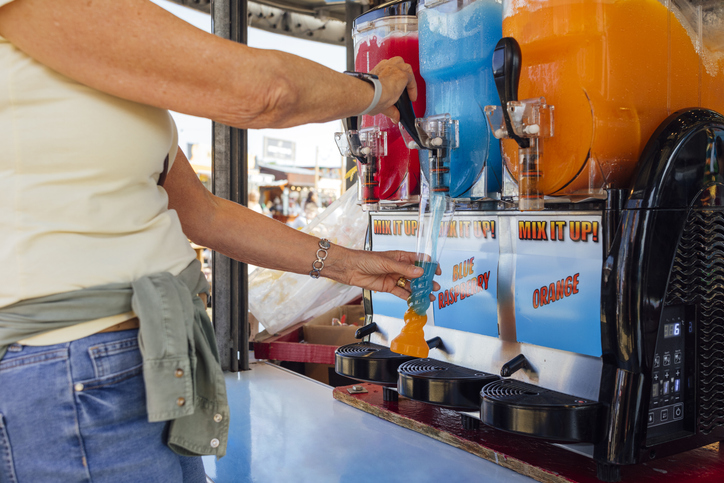The alleged ‘success’ of Mexico’s tax on sugary drinks inspired George Osborne to announce a sugar tax for the UK in 2016. But the news that the tax has led to children being poisoned by drinking frozen slushy ice drinks suggests it – just like Mexico’s – could be doing more harm than good.
Mexico’s levy was said to have reduced demand for sugary drinks in the country – it would have been surprising if it didn’t. But it did not lead to Mexicans consuming fewer calories: rates of obesity have continued to climb since the tax was introduced in 2014. One of the little-known consequences of the Mexican sugar tax is that it led to ‘a significant 6.6 per cent increase in gastrointestinal disease rates in areas lacking safe drinking water’.
They have managed to turn a harmless treat into a genuine health hazard
Before the tax was introduced, the government promised to spend the revenue on improving the country’s water supply, but this appears to have been just a shaggy dog story to trick people into supporting the policy. Much like George Osborne’s broken promise to spend the tax revenue on school sports, the money was never spent as promised. Mexico’s tap water remained as wretched as ever while the tax nudged people away from consuming drinks that were sugary but had the virtue of not causing diarrhoea. All of this in the name of ‘public health’.
A similar unintended consequence was revealed in Britain this week. A study in Archives of Disease in Childhood identified 21 cases of children in the British Isles developing hypoglycaemia and suffering from what the authors describe as ‘an acute decrease in consciousness’ after drinking ‘slush ice drinks’ such as Slush Puppies. None of the children had a history of hypoglycaemia. None of them had an episode like this again, apart from one child who became ill after drinking another slushy ice drink.
The cause of their collapse was glycerol intoxication, and the finger of blame falls on the sugar tax. The researchers found only one case between 2009 and 2017. All the others occurred after the Soft Drinks Industry Levy came into force in 2018. This is not a coincidence, as the authors acknowledge:
A cause of the recent apparent surge in cases may be the reduced sugar content of these drinks, secondary to two main factors: first, public health and parental concerns about high sugar ingestion, and second, the introduction of a ‘sugar tax’ on high sugar (>5 per cent)-containing drinks.
To avoid Osborne’s tax, several soft drink companies replaced the sugar in the drinks with artificial sweeteners such as aspartame, but this was not possible for slushies. As the dietitian Duane Mellor explained in an article for The Conversation last year, sugar reduces the freezing point of water. Without it, Slush Puppies would be solid ice. Artificial sweeteners don’t provide the slush effect, but glycerol does. And so, to keep prices down and be seen as good corporate citizens, manufacturers switched out the sugar for glycerol, otherwise known as E422, a food additive that is generally recognised as safe by international regulators.
The problem, says Mellor, is that while the human body can produce insulin to regulate blood sugar, ‘there is no way for our body to simply start using more glycerol in cells in the way we can with glucose after a meal’. After consuming glycerol, ‘the plasma in blood becomes more concentrated and can draw water from other parts of the body, including the brain, which can lead to symptoms such as headache, nausea and dizziness’. Adults and older children are big enough to consume the amount of glycerol found in slushy drinks without suffering in any way, but for smaller children, it can be a problem.
I didn’t know any of this until this week and you probably didn’t either. I’d be prepared to bet that neither George Osborne nor any of the cheerleaders for the sugar tax (hello, Jamie Oliver) were aware of the mechanics of making slushy ice drinks when they demanded that it be rolled out to as many products as possible. One of the great lessons of free market economics is that knowledge in society is widely dispersed in millions of brains and that central planners will never have access to more than a fraction of it. This crucial observation was made by F. A. Hayek eighty years ago, yet politicians and single-issue campaigners continue to bumble in with their grand plans, not realising that some things are as they are for a good reason.
In this instance, they have managed to turn a harmless treat into a genuine health hazard and are now having to warn parents not to give slushy ice drinks to children under the age of eight. It would not be surprising if they started a campaign to ban the use of glycerol in drinks. The obvious solution of exempting these drinks from the Soft Drinks Industry Levy or, better still, getting rid of the regressive and ineffective sugar tax altogether, will probably never cross their minds.







Comments